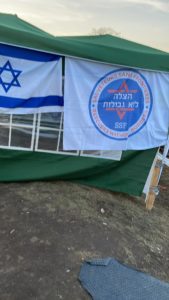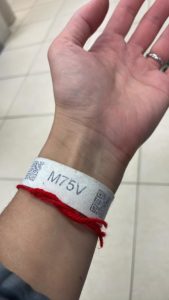Alexandra Sakurets spent this past week trying to find as much kosher chicken as she could, as she was getting ready for her daughter to become Bat Mitzvah this Shabbat. You wouldn’t know that a few days earlier, she had been working excruciating hours for weeks on end at a makeshift refugee center in a mall in southeast Poland.
“I was really hoping that it would be over by the time I came back. It’s obviously not over yet,” she said. “And it’s really not clear how it’s going to end. I think the fact that Ukraine will win, and will have the right to its autonomy, that’s pretty clear to me. I’m just really not sure exactly, when and how that will happen.”
The Maple Grove resident is a registered nurse working in the ICU at the University of Minnesota Hospital and was born in Zhitomir, Ukraine. The Russian invasion of her homeland compelled her to volunteer with the Global Disaster Relief Team along with four other medical professionals.
“That came together pretty quickly. I think as soon as we realize that there are displaced Ukrainian citizens in Poland,” she said. “The first thing you’re going to think about is their medical care.”
In her team’s area in the mall in Przemysl, Poland, they were seeing patients that were outside of the realm she usually worked in.
“What we were dealing with, was people who were acutely and chronically ill, but not requiring an intensive care unit,” she said, adding that urinary tract infections were typical of the types of illness she was helping to treat. If you’re stuck in a bomb shelter for 20 days, and it’s really pretty cold there right now, and you have no access to running water and showering, a UTI is a frequent thing that was coming up.”
Overcoming language barriers
Despite being Ukrainian, Skaurets grew up in the “very Jewish town” of Zhitomir in the time of the Soviet Union, and still considers Russian to be her first language.
“No one really spoke Ukrainian in [my] town. So the street names were all in Russian. All the documents that you signed, like government documents, all the things you saw on the streets, like the store names, were mostly Russian,” she said. “Even the school I went to, was all taught in Russian and with English as a second language. But Ukrainian was also taught there as a second language,”
However, as a Jew, she was opted out of learning Ukrainian.
“If you’re a Jew in Ukraine, living at the time that I was growing up there in the 70s and 80s, you were what was called free from learning Ukrainian,” she explained. “So learning Ukrainian was optional, but if you were written in the school roster as a Jew – even though they didn’t announce publicly that you’re a Jew, but because you didn’t go to Ukrainian class that sort of singled you out.
“I suppose I could have said ‘no, I really would like to go’ and they probably would say that you can. But how many third-graders do you know that would voluntarily learn another foreign language instead of having a free period?”
She places some of that blame on the Soviet government.
“They sort of Russified Ukraine and made learning Ukrainian extremely unpopular and impossible,” she said.
In Poland, the language barrier was pronounced but was able to use her Belarusian language skills – where her husband is from – to help.
“I would actually say that Ukrainian and Russian are more different than Ukrainian and Polish,” she said. “The roots of the words are more similar between Ukrainian, Belarusian and Polish. And then Russian sort of stands alone.
“You can sort of figure out the gist in a sentence. But in terms of more of a deeper conversation about someone’s health or their symptoms, it isn’t an easy translation.”
After unrest in Belarus in 2020 was cracked down by a Putin-allied dictator, Sakurets said that her husband decided to stop speaking Russian in their home and switch to Belarusian.
“He thought that it was important for us to speak Belarusian so that our kids would know that we are not Russians,” she said. “And it’s not the same thing; there is a difference in culture. And not to say that one culture is better than the other. It’s just to be aware of who you are.
“We know the value of language and I would say my biggest asset in this trip was my language asset. And I am extremely grateful to my husband for switching to Belarusian.”
Remembering where she came from
Speaking to TC Jewfolk in early March from Poland, she said the inspiration for going to Poland to help was the Twin Cities Jewish community, which helped to bring her and her family to the United States 33 years ago. But she also knows firsthand the refugee experience and how jarring it can be.
“I clearly remember when we crossed the border into, I think it was Poland. And from there we quickly by train to Austria,” she said. “That feeling of leaving your hometown, coming to a foreign land, hearing foreign voices for languages, seeing a very different kind of sight from a moderately sized town to, all the sudden you’re in Vienna. And just that overall feeling of confusion of where are you, what’s going to happen to you? You don’t speak the language, you don’t know what to do. You’re completely, 100% dependent on people that you don’t know.”
Sakurets named many people in the Twin Cities that were instrumental in helping her family get established here.
“Phyllis and Buddy Harris were named our host family. My first Shabbat was spent in their home, yeah, my 13th birthday was organized by Phyllis,” she said. “I think it was at Texa-Tonka Lanes.”
She went to Torah Academy “not knowing English, for sure not knowing Hebrew. They were able to teach me and other Ukrainian Russian-speaking Jewish kids, and they taught me how to read Hebrew in a year,” she said. “I remember when we moved to Minneapolis and first walked into our apartment, it was furnished and there was food in the fridge. It was old couches of someone who was donating but nevertheless, we had beds and mattresses and some things were new. And some things weren’t, which is okay. But we didn’t come to an empty place.”
Sakurets said it was easy for her to connect with the refugees. Even though her journey through Europe before coming to America was certainly different, some of the feelings were similar.
“What I was seeing was women and children were also going into cars of complete strangers. Volunteers from all over Europe flooded to these border towns to bring medical supplies, cots, blankets, and food,” she said. Her experience at 12 years old also had her picked up by random people in Italy, getting her to safe places before she could make the trip to Minneapolis. “These thoughts were the same. And of course, the women of today feel more vulnerable because they’re without spouses. All of them are alone. But that feeling of ‘I don’t know where they’re taking me’ just resonated.”
A very Jewish response
As refugees poured out of Ukraine, Sakurets said she met one Jewish family fleeing the war. But many of the medical volunteers she encountered were Jewish.
“There was just a massive Jewish presence,” she said. “I think I met more Jewish volunteers than non-Jewish volunteers.”
Some of the Israeli volunteers she met helped her practice reading the Torah portion that she’ll be chanting on the bimah.
“I would say 80% of all the medical personnel I met in the three weeks were Jewish,” she said, “serving what I would say is 99.99% non-Jews.”
After three weeks with no days off and working 12-plus hour days, she said that she’s never worked so hard in her life:
“I know what it means to work hard,” she said. “When you work as a nurse in the intensive care unit, it’s intense. But it was a shift from hell every single day.”
Sakurets told the story of a woman who showed the minuscule amounts of insulin she had left in short-acting and long-acting injectors. After 20 days of hiding in a root cellar during shelling, she didn’t dare try to venture out to find more, and later heard that the hospital and pharmacy had been bombed. Sakurets said that was a crisis that needed a quick resolution.
“There was a German physician who traveled independently of us, and he had a mobile hospital – a big van with sleeping space for him and his EMT employee,” she said. “A lot of his German colleagues were sending medications to him directly to that parking lot. So I ran out to him and I said, ‘do we have this insulin?’ And he said, ‘You know what? We do.’ They were a perfect match. Which is I mean, literally like finding a needle in a haystack. That was a big victory.”
Home, but unsettled
Yes, this is a big week for Sakurets and her family. And while she’s driving to get kosher chicken, order a cake, and make sure her four daughters have dresses, part of her is still 5,000 miles away.
“I would have stayed one more week if it wasn’t for that,” she said. Three of the four others have also gone home to North America. The fifth member of their group has more flexibility and is staying on. Sakurets posted that next week her husband will be traveling to Poland with 10 suitcases full of armored vests – 100 in total – that he’ll be delivering to the Poland-Ukraine border.
“I’m still sort of in this world and in that world as well,” Sakurets said. She shows a plastic bracelet with a QR code, which gave her access to the mall. It was on her wrist next to a red Kabbalah bracelet.
“This is my bracelet to get into the refugees. My arm doesn’t raise to take it off,” she said. “When I permanently detach from the mission, I’ll take it off. But for now, I’m sort of in between two worlds.”



